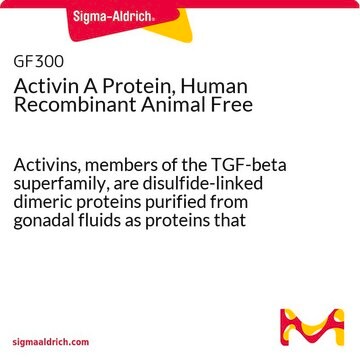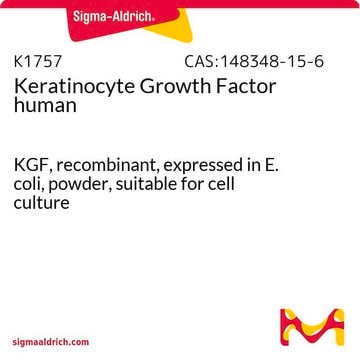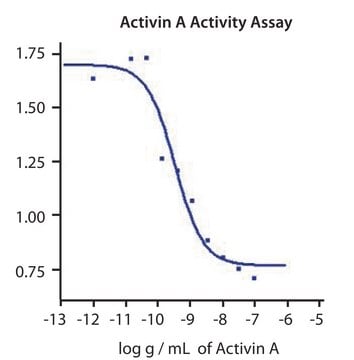A4362
Activin A human
Animal-component free, recombinant, expressed in Nicotiana, >97% (SDS-PAGE), suitable for cell culture
Synonym(s):
Erythroid differentiation protein, Inhibin beta A chain; Activin beta-A chain
About This Item
Recommended Products
product name
Activin A active human, Animal-component free, recombinant, expressed in Nicotiana, >97% (SDS-PAGE)
biological source
human
Quality Level
recombinant
expressed in Nicotiana
Assay
>97% (SDS-PAGE)
form
lyophilized
potency
≤5 ng/mL ED50
mol wt
27.4 kDa (disulfide-linked homodimers of two βA chains, each containing 116 amino residues)
packaging
pkg of 5 μg
storage condition
avoid repeated freeze/thaw cycles
impurities
Endotoxin, tested (LAL test, < 0.04 EU/ ug protein)
UniProt accession no.
storage temp.
−20°C
Gene Information
human ... INHBA(3624)
Amino Acid Sequence
General description
As with other members of the super-family, Activins interact with two types of cell surface trans-membrane receptors (Types I and II) which have intrinsic serine/threonine kinase activities in their cytoplasmic domains, Activin type 1 receptors, ACVR1, ACVR1B, ACVR1C and Activin type 2 receptors, ACVR2A, ACVR2B. The biological activity of Activin A can be neutralized by inhibins and by the diffusible TGF-B antagonist, Follistatin.
Physical form
Reconstitution
Analysis Note
ED50: ≤ 5 ng/mL
Other Notes
p.I: 7.27
Storage Class Code
11 - Combustible Solids
WGK
WGK 3
Flash Point(F)
Not applicable
Flash Point(C)
Not applicable
Certificates of Analysis (COA)
Search for Certificates of Analysis (COA) by entering the products Lot/Batch Number. Lot and Batch Numbers can be found on a product’s label following the words ‘Lot’ or ‘Batch’.
Already Own This Product?
Find documentation for the products that you have recently purchased in the Document Library.
Our team of scientists has experience in all areas of research including Life Science, Material Science, Chemical Synthesis, Chromatography, Analytical and many others.
Contact Technical Service






